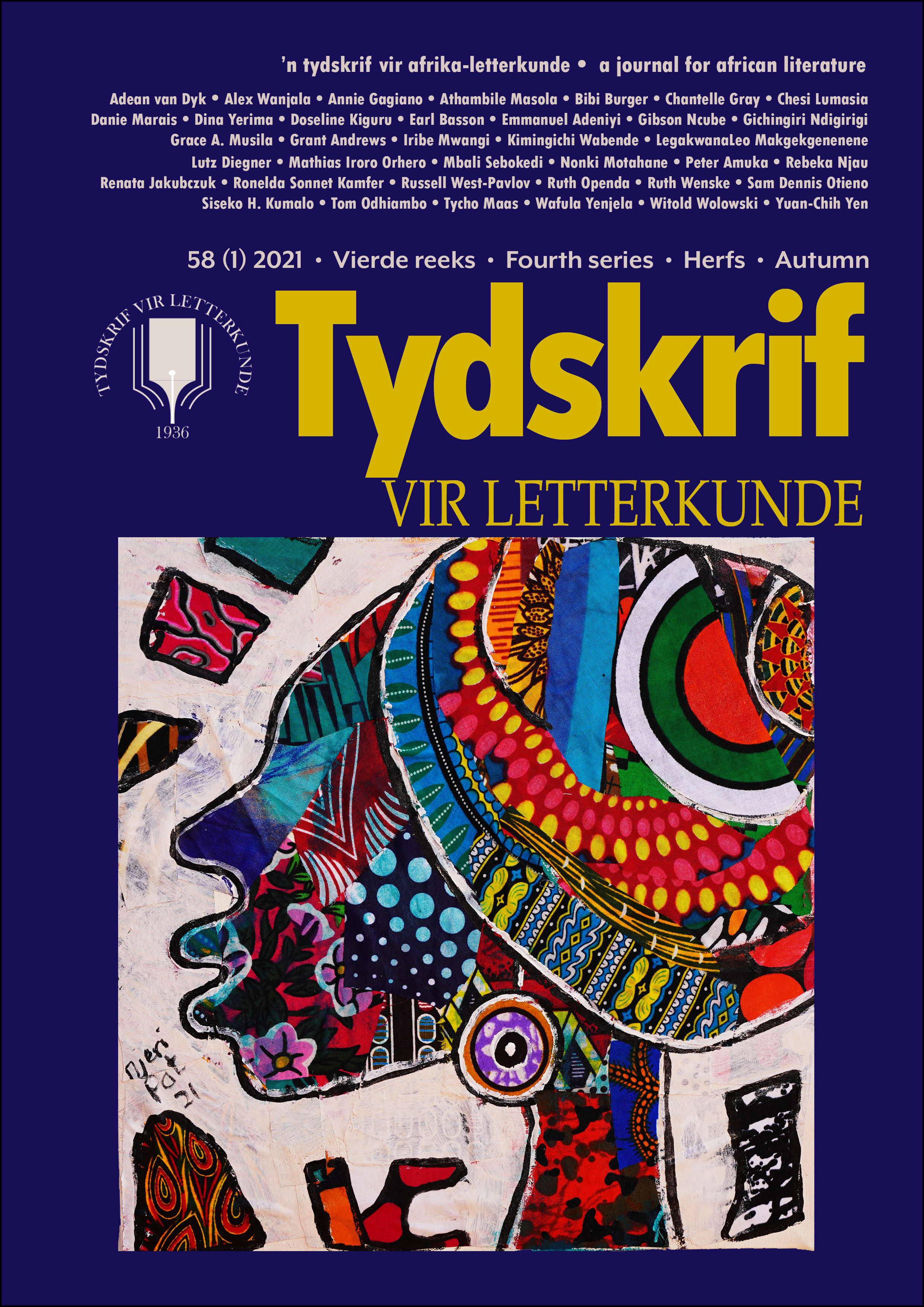Speculative fiction and African urban futures: Writing food in Billy Kahora’s edited collection Imagine Africa 500
DOI:
https://doi.org/10.17159/tl.v58i1.8426Keywords:
speculative fiction, dystopia, post-apocalypse, urban, city, food, nostalgiaAbstract
In this article I explore the place of the future African city as presented in contemporary African speculative fiction. I focus on the short stories in the anthology Imagine Africa 500: Speculative Fiction from Africa (2015) to look at how the urban space is conceptualised in these narrations of an imagined future Africa, 500 years from the present day. While the discussion looks at the urban space and imagined technological development, it highlights the ecological narratives and the contrast drawn between the city and the rural and the local and the foreign, as imagined for the future by relying on the employment of food imagery in these stories. I look at the use of food in these speculative narratives as a link between the familiar and these strange, imagined futures as presented in the anthology. I aim to provoke a debate on the imaginations of what a future African city may look like as presented through literary works and the significance of these imaginings today within developmental and environmental lenses. I read the future city through use of language, space, images, form, and style to look at how the modern short story is theorising on African futures.
Downloads
Metrics
References
Appadurai, Arjun. “Gastro‐politics in Hindu South Asia.” American ethnologist vol. 8, no. 3, 1981, pp. 494–511.
Atwood, Margaret. “Aliens have taken the place of angels: Margaret Atwood on why we need science fiction.” The Guardian. 17 Jun. 2005. https://www.theguardian.com/film/2005/jun/17/sciencefictionfantasyandhorror.margaretatwood.
Bgoya, Walter & Mary Jay. “Publishing in Africa from Independence to the Present Day.” Research in African
Literatures vol. 44, no. 2, 2013, pp. 17–34. DOI: https://doi.org/10.2979/reseafrilite.44.2.17.
Cole, Teju. “Do African digital natives wear glass skirts?” Journal of the African Literature Association vol. 11, no. 1, 2017, pp. 38–44. DOI: https://doi.org/10.1080/21674736.2017.1335946.
Davis, Caroline. “The Politics of Postcolonial Publishing: Oxford University Press’s Three Crowns Series 1962-1976.” Book History vol. 8, no. 1, 2005, pp. 227–44.
Dila, Dilman. “Snake Blood.” Imagine Africa 500: Speculative Fiction From Africa, edited by Billy Kahora. Pan African, 2015, pp. 27–46.
Huggan, Graham. “Postcolonial ecocriticism and the limits of Green Romanticism.” Journal of Postcolonial Writing vol. 45, no. 1, 2009, pp. 3–14. DOI: https://doi.org/10.1080/17449850802636465.
Hugo, Esthie. “Looking forward, looking back: animating magic, modernity and the African city-future in Nnedi Okorafor’s Lagoon.” Social Dynamics vol. 43, no. 1, 2017, pp. 46–58. DOI: https://doi.org/10.1080/02533952.2017.1345528.
Kahora, Billy, ed. Imagine Africa 500: Speculative Fiction From Africa. Pan African, 2015.
Kubuitsile, Lauri. “When We Had Faith.” Imagine Africa 500: Speculative Fiction From Africa, edited by Billy Kahora. Pan African, 2015, pp. 79–88.
Le Blanc, Ronald D. “Food, Orality, and Nostalgia for Childhood: Gastronomic Slavophilism in Midnineteenth-Century Russian Fiction.” The Russian Review vol. 58, no. 2, 1999, pp. 244–67.
Lubangakene, Derek. “Transit.” Imagine Africa 500: Speculative Fiction From Africa, edited by Billy Kahora. Pan African, 2015, pp. 127–38.
Magai, Hagai. “Those Without Sin.” Imagine Africa 500: Speculative Fiction From Africa, edited by Billy Kahora. Pan African, 2015, pp. 57–66.
Martín-Lucas, Belén. “Dystopic Urbanites: Civilian Cyborgs in TransCanadian Speculative Fictions.” Literature and the Glocal City: Reshaping the English Canadian Imaginary, edited by Ana María Fraile-Marcos. Routledge, 2014, pp. 69–82.
Mbembe, Achille. “Africa in the new century.” The Massachusetts Review vol. 57, no. 1, 2016, pp. 91–104. DOI: https://doi.org/10.1353/mar.2016.0031.
Muwonge, Frances N. “After Market Life.” Imagine Africa 500: Speculative Fiction From Africa, edited by Billy Kahora. Pan African, 2015, pp. 67–78.
Nhlema, Muthi. “One Wit’ This Place.” Imagine Africa 500: Speculative Fiction From Africa, edited by Billy Kahora. Pan African, 2015, pp. 15–26.
O’Brien, Susie. “‘Back to the World’: Reading Ecocriticism in a Postcolonial Context.” Five Emus to the King of Siam: Environment and Empire, edited by Helen Tiffin. Brill/Rodopi, 2007, pp. 177–99.
Ojwang, Dan. “‘Eat pig and become a beast’: Food, drink and diaspora in East African Indian writing.” Research in African Literatures vol. 42, no. 3, 2011, pp. 68–87. DOI: https://doi.org/10.2979/reseafrilite.42.3.68.
Onwualu, Chinelo. “The Wish Box.” Imagine Africa 500: Speculative Fiction From Africa, edited by Billy Kahora. Pan African, 2015, pp. 47–56.
Oziewicz, Marek. “Speculative Fiction.” Oxford Research Encyclopedia of Literature. 29 Mar. 2017. DOI: https://doi.org/10.1093/acrefore/9780190201098.013.78.
Retzinger, Jean P. “Speculative visions and imaginary meals: Food and the environment in (post-apocalyptic) science fiction films.” Cultural Studies vol. 22, no. 3–4, 2008, pp. 369–90. DOI: https://doi.org/10.1080/09502380802012500.
Robert, Musinguzi R. “Unexpected Dawn.” Imagine Africa 500: Speculative Fiction From Africa, edited by Billy Kahora. Pan African, 2015, pp. 115–26.
Roberts, Adam. Science Fiction. Routledge, 2000.
Sargent, Lyman Tr. “The Three Faces of Utopianism Revisited.” Utopian Studies vol. 5, no. 1, 1994, pp. 1–37.
Simwimba, Tuntufye. “Tiny Dots.” Imagine Africa 500: Speculative Fiction From Africa, edited by Billy Kahora. Pan African, 2015, pp. 107–14.
Steenkamp, Elzette L. “Identity, Belonging and Ecological Crisis in South African Speculative Fiction.” Diss. Rhodes U, 2011.
Talabi, Wole. “Necessary and Sufficient Conditions.” Imagine Africa 500: Speculative Fiction From Africa, edited by Billy Kahora. Pan African, 2015, pp. 97–106.
Urbanski, Heather. Plagues, Apocalypses and Bug-Eyed Monsters: How Speculative Fiction Shows Our Nightmares. McFarland, 2015.
Wolfe, Gary K. Critical Terms for Science Fiction and Fantasy: A Glossary and Guide to Scholarship. Greenwood, 1986.
Zaki, M. Hoda. “Utopia, Dystopia, and Ideology in the Science Fiction of Octavia Butler (Utopie, dystopie et idéologie dans la science-fiction d'Octavia Butler).” Science Fiction Studies vol. 17, no. 2, 1990, pp. 239–51.
Downloads
Published
How to Cite
Issue
Section
License
Copyright (c) 2021 Tydskrif vir Letterkunde

This work is licensed under a Creative Commons Attribution-ShareAlike 4.0 International License.


 https://orcid.org/0000-0001-6465-6584
https://orcid.org/0000-0001-6465-6584


.png)